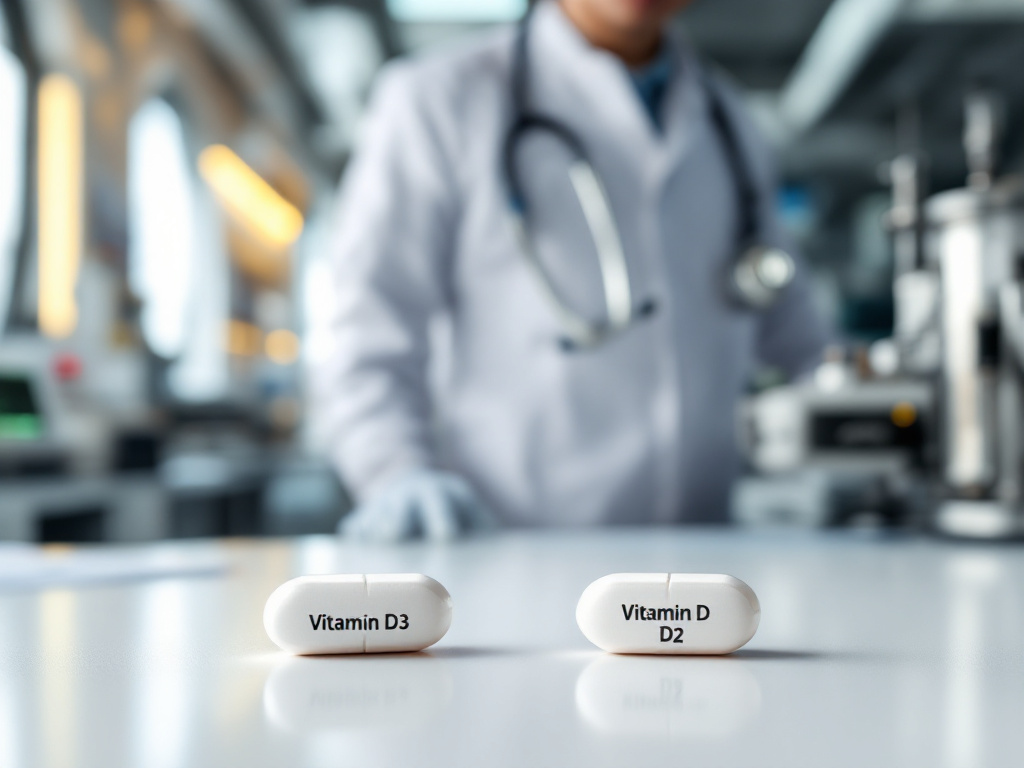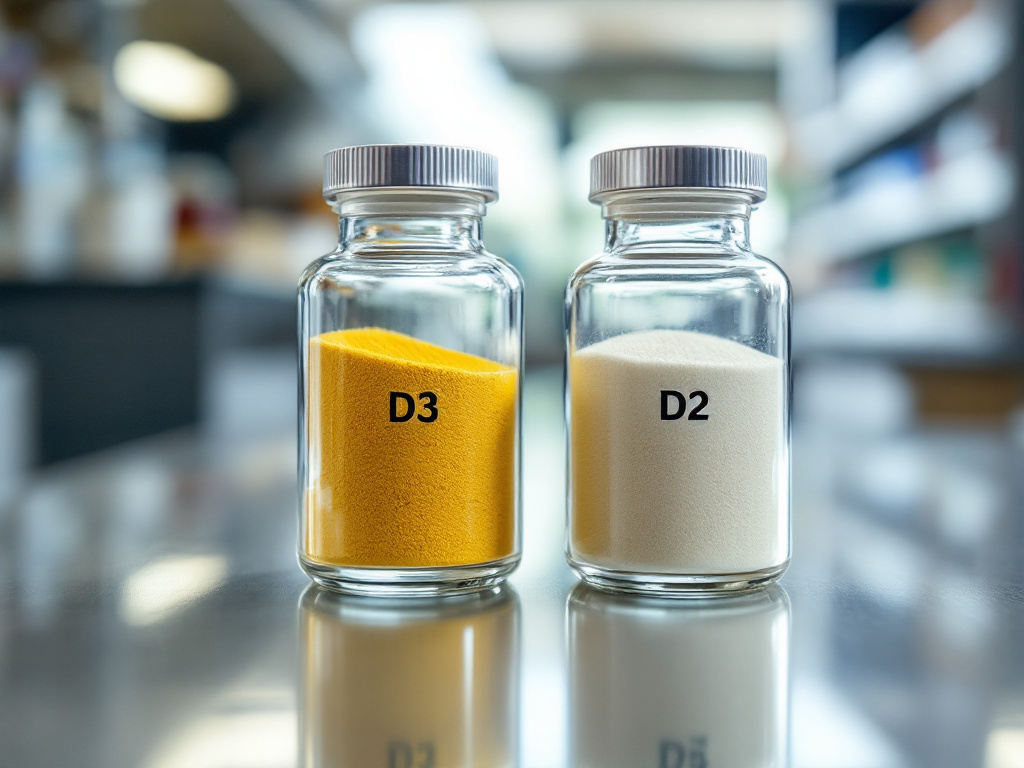Table of Contents

Key Takeaways

Vitamin D3 vs. D2: Key Differences and Sources

Frequently Asked Questions
Key Takeaways
Vitamin D3 and D2 are both essential for maintaining adequate vitamin D levels, but they differ significantly in their effectiveness and sources. **Vitamin D2** is primarily derived from plant sources, while **vitamin D3** comes from animal sources. Research indicates that vitamin D3 is more effective at raising and maintaining serum vitamin D levels compared to vitamin D2.
Key differences and considerations include:
– **Source and Origin**: Vitamin D2 is plant-based, and D3 is animal-based.
– **Effectiveness**: Studies show D3 to be more potent and longer-lasting.
– **Stability and Quality**: Vitamin D3 supplements are typically more stable and less prone to degradation.
In conclusion, while both forms can be effective, **vitamin D3** is generally preferred for its superior efficacy and stability in supplement form. When considering supplementation, it’s important to consult with a healthcare provider to determine the best option based on individual needs and health status.

Vitamin D3 vs. D2: Key Differences and Sources
Vitamin D exists in two primary forms: vitamin D3 (cholecalciferol) and vitamin D2 (ergocalciferol), with distinct origins and molecular structures. Vitamin D3 derives from animal sources, naturally forming when skin is exposed to UV radiation from sunlight, and is found in foods like fatty fish, egg yolks, and liver. In contrast, vitamin D2 comes from plant sources and fungi, created when plant compounds (specifically ergosterol) interact with UV light, and is commonly used to fortify foods such as cereals and dairy products.
Both vitamins are absorbed by the body and converted to raise vitamin D blood levels, though they follow slightly different metabolic pathways. The body processes both forms into 25-hydroxyvitamin D, which is then transformed into the active form calcitriol (1,25-dihydroxycholecalciferol). However, vitamin D3 appears to be more efficient at elevating and maintaining vitamin D levels in the bloodstream compared to vitamin D2.
| Characteristic | Vitamin D2 (Ergocalciferol) | Vitamin D3 (Cholecalciferol) |
|---|---|---|
| Source | Plants and fungi | Animals and sunlight exposure |
| Common food sources | Fortified foods (cereals, milk) | Fatty fish, egg yolks, liver |
| Effectiveness | Moderate | Higher potency, longer-lasting |

Effectiveness and Health Benefits: D3 or D2 for Optimal Vitamin D Levels?
Vitamin D3 consistently outperforms vitamin D2 in raising and maintaining blood vitamin D levels. Multiple studies and meta-analyses have shown that D3 is significantly more effective at increasing serum 25(OH)D concentrations, with some evidence suggesting D3 can be nearly twice as potent as D2 for this purpose. Both forms are absorbed well, but D3 is metabolized more efficiently and results in higher and more sustained blood levels.
| Form | Potency | Stability |
|---|---|---|
| Vitamin D3 | High | Greater |
| Vitamin D2 | Lower | Degrades More Easily |
Though both D2 and D3 can correct deficiency, clinical evidence favors D3 for optimal and sustained vitamin D status. D3’s superior potency and stability suggest it is generally the preferred supplement for improving and maintaining healthy vitamin D levels.
Choosing the Right Vitamin D Supplement: Safety, Dosage, and Practical Considerations
Selecting a vitamin D supplement requires careful attention to dosage, safety, and individual needs. For most healthy adults, daily doses of 600–800 IU are sufficient and safe, while the maximum recommended intake is 4,000 IU per day to avoid toxicity. Exceeding this threshold can increase the risk of adverse effects—such as high blood calcium, kidney issues, and gastrointestinal distress—especially with prolonged high-dose use.
- Dosage: 600–800 IU daily is adequate for most; do not exceed 4,000 IU unless directed by a healthcare provider.
- Availability: Both D2 and D3 supplements are widely available over the counter; higher-dose or prescription options may be advised for diagnosed deficiencies.
- Potential Side Effects: Overdosing can cause nausea, weakness, and elevated blood calcium levels.
- Individual Factors: Consider allergies, dietary restrictions (e.g., vegan/vegetarian options for D2), and underlying health conditions.
Always match supplement choice to your dietary preferences, medical needs, and physician guidance to support safe, effective, long-term vitamin D status.
Conclusion
Evidence consistently shows that vitamin D3 is more effective than D2 at raising and maintaining blood vitamin D levels, offering better stability and potency for most people. While both forms are readily absorbed and available over-the-counter, D3 results in higher and longer-lasting serum 25(OH)D concentrations, making it the preferred choice for optimal supplementation when no dietary or medical restriction exists.
| Supplement | Potency | Duration |
|---|---|---|
| Vitamin D2 | Lower | Shorter |
| Vitamin D3 | Higher | Longer |
Selecting between D2 and D3 depends on individual needs and preferences, but for maximizing vitamin D status, D3 is generally recommended. Always consult a healthcare provider to tailor supplementation to your specific health situation and goals.
Frequently Asked Questions
Which form of vitamin D is more effective?
Vitamin D3 (cholecalciferol) has been shown to be more efficacious than vitamin D2 (ergocalciferol) at raising serum 25(OH)D concentrations in the body. Multiple clinical studies indicate that D3 not only elevates vitamin D levels higher but also maintains those levels for a longer duration compared to D2 supplements.
Do I need a prescription for vitamin D supplements?
Both vitamin D2 and D3 are available over the counter in various strengths and forms, including capsules and oral liquids. Only higher-strength formulations or injectable forms require a prescription from a healthcare provider. Many vitamin supplements combine D vitamins with other minerals and nutrients.
What are the side effects of vitamin D supplementation?
Side effects from recommended doses of vitamin D are rare. Some people may experience a metallic taste or minor stomach upset. Higher doses can cause symptoms like nausea, decreased appetite, increased thirst, or muscle weakness—all signs of potential vitamin D toxicity that should prompt immediate consultation with a healthcare provider.
Are there stability differences between D2 and D3 supplements?
Research suggests that vitamin D2 supplements may be more sensitive to humidity and temperature fluctuations, potentially making them more prone to degradation over time compared to D3 supplements. However, the clinical relevance of this difference remains uncertain, particularly for oil-based formulations of both vitamins.
